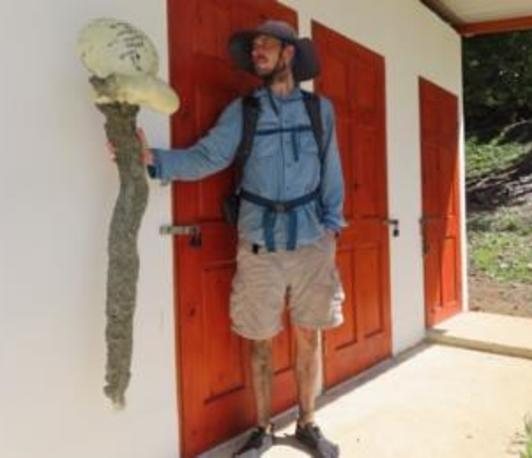Nature’s housing market: architectural foundations of animal social life
Guest seminar by Mark E. Laidre
- Datum: 26.03.2025
- Uhrzeit: 14:00 - 15:00
- Vortragende(r): Mark E. Laidre
- Mark Laidre works at the scientific interface of behavior, ecology, evolution, and conservation. For the past 20 yrs, his in-depth research has focused on the shell ‘housing markets’ of both marine and terrestrial hermit crabs. He and his student co-authors have published >50 peer-reviewed scientific publications on field-based research around the world, particularly in the tropics. His long-term research program has spanned Cornell University, Cambridge University, Princeton University, UC Berkeley, and Dartmouth College. Furthermore, he has taught biology classes for over a decade as a Dartmouth professor. From 2025 to 2029 he is PI of a long-term research project, funded by National Geographic, focusing on whole-island experiments on coconut crabs (Birgus latro) across the Indo-Pacific. Much of his research was inspired by reading Darwin. He and his partner also have a dog named Darwin.
- Ort: Bückle St. 5a, 78467 Konstanz
- Raum: Seminar room MPI-AB bücklestrasse 4.06
- Gastgeber: Barrett, Brendan James
- Kontakt: bbarrett@ab.mpg.de

Architecture and social behavior might appear to occupy different worlds: one the physical world, the other the social world. Yet for many animals these two worlds are intimately connected, having reciprocally shaped one another over ecological and evolutionary time. This talk focuses on over a decade of research on nature’s housing market, particularly the deep links between architecture and social behavior among highly social terrestrial hermit crabs (Coenobita compressus). This species evolved to occupy architecturally remodeled shells, which are passed down across generations, such that individuals must navigate a shell housing market that necessitates complex decision-making and social interaction with conspecifics. Building on a strong grounding in natural history, our long-term experiments and longitudinal studies in this system have sought to deduce general principles of how and why architecture and housing markets shape social behavior. Our findings reveal the fundamental importance of integrating studies of behavior, ecology, and evolution, and also highlight the value of interdisciplinary collaborations with engineers and other scientists. Our in-depth work in this system lays a foundation for broader study of the dynamic feedbacks between architecture, housing markets, and social behavior across a wide variety of further species. Finally, leveraging this foundation of earlier work, I suggest how studying nature’s housing market can have relevance to conservation, as illustrated by whole-island experiments, which are testing the impact of housing availability on population recruitment of coconut crabs (Birgus latro) across the Indo-Pacific.